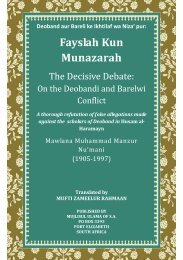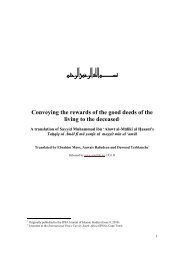al_etidaal_gn
al_etidaal_gn
al_etidaal_gn
You also want an ePaper? Increase the reach of your titles
YUMPU automatically turns print PDFs into web optimized ePapers that Google loves.
Rasulullah (S<strong>al</strong>l<strong>al</strong>lahu Alayhi Was<strong>al</strong>lam) prohibited it and you say there is no harm in<br />
it. By Allah, I swear, never sh<strong>al</strong>l I ever join you in this house again.” (Darmy)<br />
All the Ulema, jurists and Ulema of Hadeeth - whether of the early era of Islam or the<br />
later decades - <strong>al</strong>l have unanimously agreed that the deni<strong>al</strong> of belief in anything which<br />
has been proven conclusively and categoric<strong>al</strong>ly as being part of the deen, is kufr.<br />
It has been stated by Qazi Ayas in Shifa and by Mulla Au Qari in the commentary on<br />
Shifa that there is complete consensus and agreement among <strong>al</strong>l Muslim Ulema that<br />
such a person becomes a kaafir who believes it is permissible to kill a Muslim or to<br />
commit adultery or to drink wine or to deny any such thing which has been<br />
categoric<strong>al</strong>ly proven to have been continuously and successively part of the deen<br />
throughout the ages. However if the person is a new convert to Islam and has not yet<br />
come to know the teachings of Islam, he will be excused.<br />
Shah W<strong>al</strong>liyullah (Rahmatullah Alayh) has written in Iza-latul-Khifa that there are<br />
three cases when it is permissible to revolt against a king. Among them, one case is<br />
when the king by denying any of the essenti<strong>al</strong>s of deen, becomes kaafir. In such a<br />
case it is compulsory to rebel agianst him. This is the most excellent type of Jihad.<br />
Similarly it is a grave error and one is considered to have gone astray if he dissents in<br />
anything which is beyond <strong>al</strong>l differences of opinion. In Sharh Mawaahil Allama<br />
Zurqani (Rahmatullah Alayh) write: “The differences of opinion of this Ummat in<br />
those matters that <strong>al</strong>low scope for ijtihad (reasoning and conclusion by an<strong>al</strong>ogy) is a<br />
mercy -a great mercy- and latitude for Ummat and <strong>al</strong>l the various verdicts arrived at<br />
will be such as if there are different Shariahs - <strong>al</strong>l of which were brought by<br />
Rasulullah (S<strong>al</strong>l<strong>al</strong>lahu Alayhi Was<strong>al</strong>lam). Hence the conclusion drawn by the<br />
Sahabah (Radi<strong>al</strong>lahu anhum) and the Ulema after them for the deeds and words of<br />
Rasulullah (S<strong>al</strong>l<strong>al</strong>lahu Alayhi Was<strong>al</strong>lam) are <strong>al</strong>l like different Shariahs. This too<br />
forms part of the miracles of Rasulullah (S<strong>al</strong>l<strong>al</strong>lahu Alayhi Was<strong>al</strong>lam). However to<br />
introduce ijtihad into beliefs is a major error and deviation from truth. Truth is only<br />
that on which the Ahlis Sunnah w<strong>al</strong> Jamaat base their belief.”<br />
By the dissent that is praised in the Hadeeth is meant only the dissent in lesser, nonprinciple,<br />
sub-section<strong>al</strong> affairs - (Furoo-i). And the division that is prohibited means<br />
division in matters of principle (Usooli).<br />
Allama Subki (Rahmatullah Alayh) says that there is not the slightest doubt therein<br />
that to differ in major ahkaam is error and deviation. This kind of dissent is a cause<br />
for <strong>al</strong>l corruption.<br />
Here is an example. Take the question of FATE (Taqdeer). This is one of the<br />
principle, major masaail. The Shariat even forbids any discussion on it. Such dire and<br />
grave warnings have been given in the Hadeeth against creating any dissent therein<br />
that we must seek refuge in Allah from such error. Rasulullah (Sail<strong>al</strong>lahu Alayhi<br />
Was<strong>al</strong>lam) said: “The Qadiriya sect -(those who deny the doctrine of FATE<br />
(predestination) are the magians (majoos) of this Ummat. If they f<strong>al</strong>l ill, do not visit<br />
them and if they die, do not join in their funer<strong>al</strong> prayers.” (Abu Dawood).<br />
Al- Eti’da<strong>al</strong> Fi Maraatibur- Rija<strong>al</strong> 165




